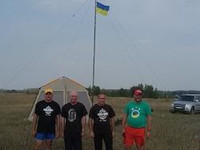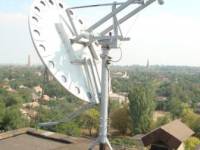Главная » 2019 Июнь 11 » Czech Pohotovostní Test. Чехия проводит тест на 50МГц 13 июня.
10:26 Czech Pohotovostní Test. Чехия проводит тест на 50МГц 13 июня. | |
См. информацию о тесте внизу:
Czech Pohotovostní Test Category: VHF/UHF/SHF Published: Saturday, 04 May 2019 15:30 Written by Hans Blondeel Timmerman https://www.iaru-r1.org/index.php/vhfuhsshf/1854-czech-pohotovostni-test Introduction Agenda Item 1.1 for the 2019 World Radio Communications Conference (WRC) invites the WRC to consider an allocation of the frequency band 50-54 MHz to the amateur service in Region 1. The Czech regulator CTO is investigating if theoretical study results match real life situations. An initial trial took place under flat propagation conditions on 28 February 2019 in the Czech Republic. One of the objectives of the test was to verify that military and amateur radio stations could co-exist in the 50 MHz band. A second test when enhanced propagation conditions are more likely to occur will take place in the Sporadic E season on 13 June 2019. The worldwide amateur community is invited to participate in this second 50 MHz activity day, called Pohotovostní test or P-test. During this event other users of the 50 MHz band will operate their own professional communication systems. These stations MUST not be jammed or interfered with. The purpose of this event is to show regulators that amateurs and military stations can coexist without causing harmful interference to each other. This event will be monitored by the Czech authorities and maybe other regulators, as well as other professional users (mainly governmental including military users). It is expected and hoped that the results of this second international trial will provide similar results to those recorded in the first national Czech trial. Background for POHOTOVOSTNÍ test Pohotovostní is Czech for readiness or willingness to participate. In the past the word was used by the former headquarters of the Czech amateurs to demonstrate that amateurs are valuable for Public Protection and Disaster Relief as first responders. During the past 20 years two or three such activities were organized, being announced in the media with a very short notice period for radio amateurs. The 28 February pohotovostní was announced about 2 weeks in advance, still following the original idea of emergency preparedness. Rules Date: 13 June 2019 Time: 1stactivity period 07:30-09:00 UTC (09h30-11h00 CEST) 2ndactivity period 11:00-12:30 UTC (13h00-14h30 CEST) Calling: CQ P (CONTEST) Information to be exchanged: RST (RS) + Number of QSO from 001 + 6-digit WW-locator + name of the QTH. During the second activity period start from 001 again. For instance: 579 011 JO70fb PRAHA Maximum output of transmitter: 25WPEP transmitter output power (the maximum power in Czech Amateur radio service regulations). Foreign stations are requested to use the same output power to enable comparisons with the first test on 28 February. Categories: One common category The use of spotting networks is permitted. Points: 1 point for 1 km of distance of each QSO. A QSO with the own locator scores 1 point. Extra points can be collected for each correctly received QTH – 10 points for each new QTH. The same stations may be contacted in both activity periods, in three different modes (CW, SSB, digi). The total score is the sum of all “km” points + the sum of QTH points collected from the two activity periods. Logs are to be submitted not later than 48 hoursafter the end of the contest (15 June 2019 12:30 UTC) to rtty@crk.cz The log should have a plain text header containing in an understandable format: - the name of the contest: Czech Pohotovostní Test - date: 13 June 2019 - your callsign - Maidenhead locator (Six digit) - the name of the QTH used during the contest - Total Number of QSOs: - Number of SSB QSOs: - Number of digital QSOs: - Number of CW QSOs: - Number of QSOs with QTH received: - SUM of km points for all modes - SUM of QTH points - total SUM of points - Name of the operator - email address of the operator - used transmitter or transceiver - used antenna - used power - LOGs in any readable format must be attached, most common logging formats will be accepted, including common formats like txt, doc, odf, xls etc. Please do not use pdf. Time must be in UTC. Logs must include a declaration that: the rules of the test and the national amateur regulations have been observed, the data submitted is correct. the log data can be used for evaluation purposes by CRC and the Czech Regulatory Authority, and in documents intended for submission to CEPT, ITU and within the amateur community. - To count the km points you might use any convenient VHF/UHF log or a calculator can be found in many places over the internet. For instance https://www.chris.org/cgi-bin/finddisor http://www.radio-foto.eu/radio/locator.phpand many others. - CRC will share the logs with CTU. The results will be published on www.crk.czand distributed to all participants by email. On behalf of Czech Radio Club, Jiri OK1RI and Milos OK1MP Note: We would like to involve amateur stations experimenting with wideband modes in this test e.g. reduced bandwidth digital television or other wide-band emissions. Such stations would need to participate in the 2ndactivity period. If there are any such stations wishing to participate in this test they should contact EI3IO at EI3IO@connogue.com By participating in this test you may help the amateur service obtain spectrum with a suitable status in all or part of the 50-54 MHz frequency band. | |
|
| |



